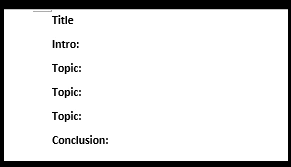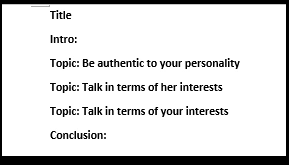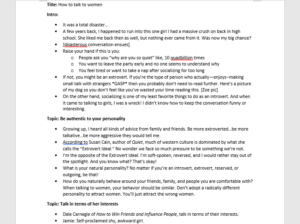The first time I told one of my friends about Quietly Romantic newsletter, he told me that it was “an ingenious way to make money”. Several of them asked me how I came up with this idea, and some of my readers have even emailed me asking if I could help them do something similar. Today I want to show you how you can do the same. Yes, even if you don’t have an English degree and even if you’re “not a good writer”. I’ll show you how to write the type of content that…
- Got me featured in sites such as Huffington Post and Yahoo!
- Establishes you as an expert in your industry
- Drives passive sales, and
- Changes the world
Here are several questions that my readers have asked about writing and my responses:
What do you do every day to help you write?
The one thing that’s made the most difference for me is planning out beforehand when I’m going to write and what I’m going to write about. Every Sunday I pick a topic and then I mark the specific times I’m going to write about it down on my calendar. As Mahrukh Imtiaz puts it, “we make a lot of decisions – and each time we make a decision that is good for us but is a difficult decision, we use our willpower.” By planning out beforehand exactly when you’re going to write, you save your willpower and have more creative energy for producing content.
Also, I highly recommend getting into reading. By reading well-written books, you get a sense of how to create well-written content. A great book on writing is Bird by Bird by Anne Lammott.
What do you do when you can’t write?
Whenever I can’t write, I aim for only 500 words and then give myself permission to retire. As Pablo Picasso said, “Inspiration exists, but it has to find you working.” Sometimes after I write 500 words, I build up momentum and feel motivated to continue writing. Other times, I don’t. That’s fine too. If I feel like writing some more, I’ll keep going. If not, I retire for the day after 500 words.
Typically, I write my outlines on Monday. Because, let’s face it, Mondays suck. Writing outlines are much less exhausting than writing the draft for the article, so I reserve the worst day of the week to do it. Also, don’t try to “push through” writer’s block. If you can’t get any more words out, then you just can’t. Just as you can’t “push through” having low gas in your car, you shouldn’t try to push out more content if you’re running on fumes. Accept that you’re done and come back the next day.
Do you write about one topic specifically or is it just random stuff?
When I’m writing on my blog, I typically try to stay within the realm of dating advice because that’s the main reason people come to my site. Within the sphere of dating advice, there’s infinite possibilities to write about. Just a few topics off the top of my head include…
- How to talk to women
- Where to meet women
- How to be confident
…and each of those topics also has infinite possibilities. If we explore the topic of talking to women, we can come up with even more possibilities such as…
- How to talk to a woman at a bar
- How to tell an interesting story
- How to carry on a conversation without running out of things to say
Now, if there’s something I feel strongly about then I’ll sometimes write about that as well. Other topics I’ve written about include “How to go high when others go low in today’s political climate” and “The value of enough in a culture of scarcity”. These topics deal with living an honest life, which makes you more attractive as a person and thus indirectly relates to dating advice.
Finally, if you’re writing for someone else then by all means feel free to venture outside of your chosen sphere. This might happen if you’re trying to get a guest post on someone else’s website who has a tangential audience to yours. Remember that you’re writing for their site, not yours, so your content and voice should align with their writing style.
Do you time limit yourself?
When you first start writing, you should take as much time as you need. A lot of us haven’t written an essay since high school or college, and creating your first pieces of remarkable content always takes more time than you think. Don’t get discouraged if it’s not coming as fast as you expected. Know that it’s going to take a while and plan accordingly.
As you write more and more, you’ll start to get an idea of approximately how long it takes to create a piece of content. You start to understand how many hours it takes. From there, you work backwards. If you want finish writing an article by next Thursday and you know it takes you five hours to write a post, you can go to your calendar and pencil in five hours between now and next Thursday for writing. By the time next Thursday rolls around, you’ll have your content ready for publishing!
How do you ensure the editing is well done? Do you get it proofread by others?
They say that the best way to learn something is to teach it to someone else. Personally, I think my writing is good when I’ve learned something from having written it. As Brené Brown puts it in Dare to Lead, “Write what you need to read”.
When you’re starting out, I think you absolutely should get it proofread by others. Again, many of us haven’t written a single essay since school. Getting mentored from people who are above you is one of the quickest ways to improve your writing. If you’re happy with your current level of writing or if you have other priorities with your business (such as creating a course or working with a client) then it’s not necessary. Personally, I’m not having my work proofread by others because it’s just not a priority right now. However, if you want to advance your writing skills to the next level, you definitely should seek out people who are higher up than you are.
How do you know whose criticism is worth taking?
It’s important to get feedback from several different people because it gives you several different perspectives on a topic. If you have one problem and you ask two different people for advice, Person 2 might know a better solution than Person 1 does. You wouldn’t know that unless you went out and talked to both of them.
When it comes to knowing whose feedback to take, you want to understand what’s behind the advice they’re giving you. Say that Person 1 tells you to do X and Person 2 tells you to do Y instead of X. How would you know whose advice is worth taking? As you listen to Person 1 and Person 2, temporarily assume that their advice is both true for the sake of argument. After you’ve heard what they have to say, try to understand where they’re coming from. What’s behind what they’re saying? Do they have an agenda? Are they operating from different business models? Different points-of-view? Which person do you want to be more like?
Where do you save all your stats and fun stories?
I save all my ideas and stories using a Word Doc in Dropbox. It’s important to have these saved somewhere portable where you won’t lose everything if your PC suddenly dies, but also keep in mind that exactly how you store these doesn’t really matter that much. You can save them in Microsoft Word, or in the Notes app on your iPhone, or on Evernote, or wherever. Just pick the one you like best and move on.
Is there a structure that you follow when writing? How and where do you begin?
First, I begin with an outline. Writing an outline really helps because it lets you see at-a-glance whether the organization of your ideas makes sense and it lets you add/delete/move around ideas in seconds. I start off with this…
…then I decide broadly what I want my topics to be about…
…and then I fill in the blanks.
Next, I use the outline to help me create a rough first draft. First drafts are always terrible. It’s less important that your first draft is coherent and more important that you get your ideas down on paper. Finally, I polish up the draft by revising it twice.
How do you know when a blog is complete? Or if it’s too short or too long? Can it be 2 blogs?
For me, a blog is complete after three rounds. The first round is my rough draft, where I get all my ideas down on paper stream-of-consciousness style without any regard as to whether it looks good. The second round is where I go back, make it more coherent, and add/delete/move ideas around. Finally, the third round is where I read through everything once more and make sure it sounds conversational.
After three rounds, I deem the article “good enough” to be published—even if I still feel like there’s room for improvement. There will always be room for improvement, but it’s less important for you to revise it endlessly and more important for you to just get it out there and see how people react. Back in school, writing a mediocre essay would give you a bad grade that followed you around for the rest of the semester. But in the real world, there’s no penalty for writing an article that turns out to be so-so. Just get it out there after three rounds and start collecting feedback.
Length doesn’t matter. It can be short or it can be long. You can make it into two articles if that’s what you want. For me, an article it’s good when I’ve said what I wanted to say. That can be just a few paragraphs, or it can be several pages. With that being said, however, when I’m writing a guest post for someone else I do try to make it meatier (at least 2,000 words). Longer articles tend to be perceived as higher quality, and you do want to leave a good impression on both the blogger you’re writing for and their audience.
Now what?
I’m going to be totally honest, it takes a monumental amount of work in the beginning. Most people just aren’t willing to put in the work. It’s also one of the most rewarding things I’ve ever done. Few things are more amazing than knowing I’m changing the world with every article I create.
Have any more questions about writing that I haven’t addressed? Let me know! I’d love to help you.


